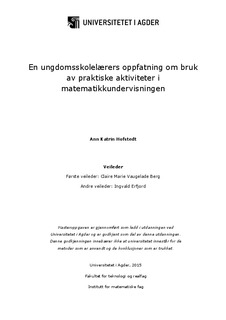| dc.contributor.author | Hofstedt, Ann Katrin | |
| dc.date.accessioned | 2015-09-21T07:30:01Z | |
| dc.date.available | 2015-09-21T07:30:01Z | |
| dc.date.issued | 2015 | |
| dc.identifier.uri | http://hdl.handle.net/11250/300788 | |
| dc.description | Masteroppgave matematikkdidaktikk- Universitetet i Agder, 2015 | nb_NO |
| dc.description.abstract | The aim of this study was to illuminate a teacher’s beliefs and attitudes towards practical activities in mathematics. To reveal this, I developed a teaching plan consisting of four activities. In which the students were going to construct fraction problems, knowledge of reciprocal fractions and perceive knowledge of correlations between different representations of the same value. This representation was: fraction, decimal numbers, percentage and geometrical.
The research questions for the study are:
1. How does a teacher evaluate a teaching plan emphasizing practical fraction activities?
2. How does a teacher evaluate use of practical activities in teaching of mathematics, and what are the reasons for teacher’s use or don’t use of such activities?
Data collection in the study consist of three phases, two unstructured interviews, one before and one after the teaching plan was carried out in the classroom, and observations during the teaching. The teacher evaluated and had suggestions to the teaching plan. Subsequently I conducted a pre-analysis where I made changes in the teaching plan. In the second unstructured interview with the teacher, we discussed the teacher’s beliefs and attitude towards the completed teaching plan and general perceptions of the use of practical activities.
The theoretical framework of the study is built upon perceptions and how teachers' beliefs influence teaching practice. Learning styles, the Dunn and Dunn learning style model and Böstrom research on perception preferences in my theoretical framework, highlights that students learn in different ways. The theory chapter also includes previous studies on perceptions and use of practical activities.
The findings indicate that the teacher has a positive attitude towards use of practical activities, but that the use of these activities is limited by several factors where particularly the pressure on time and exam in the secondary schools are highlighted. The findings indicate that use of practical activities are elements of teaching that helps students experience increased motivation and interest in mathematics, but also that practical activities facilitates for different learning styles. The design of the study also provides insights on research and development in which close cooperation between researcher and a teacher contributes insights about each other's practices. | nb_NO |
| dc.language.iso | nob | nb_NO |
| dc.publisher | Universitetet i Agder ; University of Agder | nb_NO |
| dc.subject.classification | MA 502 | |
| dc.title | En ungdomsskolelærers oppfatning om bruk av praktiske aktiviteter i matematikkundervisningen | nb_NO |
| dc.type | Master thesis | nb_NO |
| dc.subject.nsi | VDP::Mathematics and natural science: 400::Mathematics: 410 | nb_NO |
| dc.subject.nsi | VDP::Social science: 200::Education: 280 | nb_NO |
| dc.source.pagenumber | 100 s. | nb_NO |
